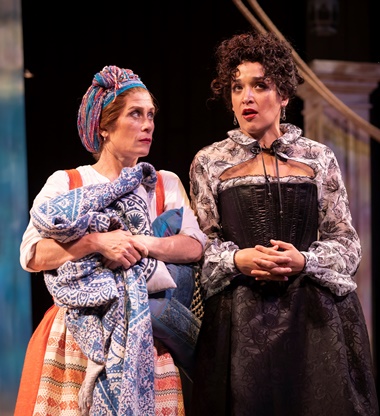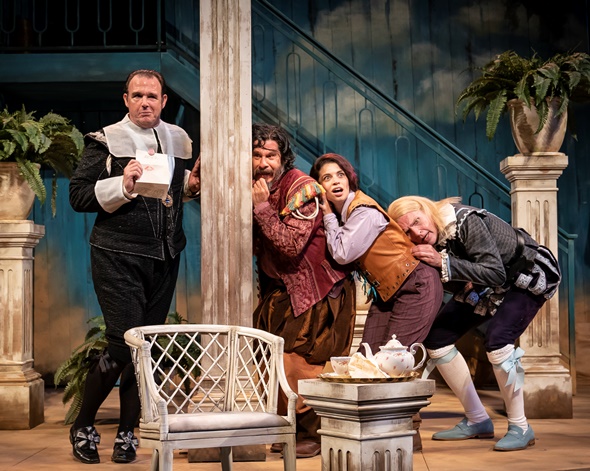Shakespeare at American Players: Some have greatness thrust on them; others, not so much

Disguised as a young man, Viola (Kelsey Brennan) is enamored of Duke Orsino (Gavin Lawrence), who loves another woman. Viola awkwardly serves as his emissary. (Photos by Liz Lauren)
Review: At American Players Theatre, Shakespeare’s “Twelfth Night” (through Oct. 6 ★★★★) and “Macbeth” (through Oct. 4 ★★).
By Lawrence B. Johnson
SPRING GREEN, Wis. – American Players Theatre, now in its 40th summer of primarily outdoor productions in a charming little arena in the hills some 30 miles west of Madison, has always regarded Shakespeare as its badge of honor, reference point and indeed its reason for being. That tradition is manifest in a spirited and sure production of “Twelfth Night,” but a dubiously conceived and oddly cast “Macbeth” betrays this excellent company’s allegiance to the Bard.
Rather than holding an ill-fitting shoe in abeyance, let’s drop it right here. The “Macbeth” directed by James DeVita suffers on every side. King Duncan’s son Malcolm is turned into a daughter, though she is still called Malcolm. Banquo, Macbeth’s valiant fellow soldier in arms, dauntless on the battlefield, a role that wants imposing physical prowess and a voice to go with it, is also played by a woman – a current fashion taken here to silliness.
Though both choices strike me as unfortunate, both Cristina Panfilio as Malcolm and Laura Rook as Banquo lend their characters sympathy and clarity. But a broadsword in the hands of this too-fair Banquo? Is this Joan of Arc of the highlands?
And what in the world is gained by referring to Malcolm in the feminine? I have no problem at all with switching young Malcolm into a “trouser” role – as the device of a woman portraying an adolescent boy is known in the opera world; and Panfilio carries it off with conviction. But arbitrarily to turn the lad into a lass, still called Malcolm, hardly rises above a precious distraction.
The ultimate and intractable problem with this “Macbeth,” however, is the glaring reality that two experienced and accomplished APT veterans, Marcus Truschinski and Melisa Pereyra, are adrift in their roles as Macbeth and his mortally aggressive wife. At least in the performance I saw, Pereyra essentially recited Lady Macbeth’s crucial reading of Macbeth’s letter to her in which he recounts how the three weird sisters had accurately foretold his promotion to Thane of Cawdor and then added the promise of king-to-be. Far from blood-curdling, Pereyra’s unmeasured speech was downright tepid. And later, when this Lady Macbeth almost airily admonished the reluctant Macbeth to screw his courage to the sticking place, I half expected the complaisant fellow to look around for it.

King Duncan (Triney Sandoval) counsels his young son Malcolm (Cristina Panfilio), portrayed as a daughter in this production directed by James DeVita.
Likewise, in his turn, Truschinksi persistently displayed a disconnect between Macbeth’s words and their meaning. In one of the great speeches ever penned, when Macbeth, hearing of the crazed Lady Macbeth’s death, reflects on the futility and meaninglessness of life, this “walking shadow, a poor player that struts and frets his hour upon the stage, and then is heard no more – a tale told by an idiot, full of sound and fury, signifying nothing,” the speaker scarcely paused for breath or emphasis in his correct and headlong delivery of the lines.
Remarkable, and most remarkable. Albeit not in a good way. One last quibble. Director DeVita passes on the chance to show us what Macbeth sees when the slashed corpse of Banquo appears at the king’s house party. Instead, the reeling Macbeth reacts to nothing, an empty seat, a vapor visible only to him. Yes, we get it, but how much more powerful when we can share the guilty Macbeth’s hallucination of bloody Banquo there before him, taunting him, condemning him. And one last credit: Gavin Lawrence’s engaged, thoughtful Macduff is the real stuff of Shakespeare at American Players.
“Twelfth Night” was, in the experiential sense of the phrase, a lot more fun. Which brings me right back to Gavin Lawrence, whose pining Duke Orsino – ever rebuffed by the lovely Olivia, but ever hopeful – provided a nice foil to Kelsey Brennan’s charmingly game Viola. Shipwrecked, then disguised as the young man in the unsuspecting Duke’s service, Viola becomes go-between in Orsino’s quest to win Olivia. But everything goes haywire when Olivia is smitten with the boy that Viola appears to be, and Viola falls completely, hopelessly in love with the Duke.
Meanwhile, at Olivia’s estate, her dissolute cousin Sir Toby Belch, his fobbish pal Sir Andrew Aguecheek and the lady’s fool Feste create a noisy drunken din day and night. All of this tolerated with a wink by Olivia’s attendant Maria and roundly disapproved by the lady’s prudish steward Malvolio. Wonderful, inexhaustible comedy that ever edges toward farce but is ever softened by zephyrs of love. And director John Langs manages the whole mashup with a deft touch.

Amazed at events in her household, Olivia (Aila Peck) consults with her lady-in-waiting Maria (Colleen Madden).
I suspect that whenever one mentions a production of “Twelfth Night” to a Shakespeare enthusiast, the first question is, “Who played Malvolio?” Proud, self-absorbed, condescending, Malvolio – by name, he of ill will – is one of Shakespeare’s finest comic characters, as if in spite of himself. David Daniel brings irresistible hauteur to the part; and when this puffed-up curmudgeon is lured into his own humiliation, Daniel chews on the bait with ravenous relish.
Starting with Olivia herself, a delightful head-over-heels performance by Aila Peck, the lady’s household is populated by winning characterizations: Triney Sandoval as the devoutly inebriated Toby Belch, Ted Deasy as a simple and feckless Aguecheek and La Shawn Banks in a grandly drawn version of the wise fool Feste. Perhaps most fetching of all is Colleen Madden’s shrewd inhabitation of Olivia’s wily serving lady Maria.
There’s a sort of commonality between “Macbeth” and “Twelfth Night,” the latter being full of sound and fury signifying, well, not a lot. Except that in this mid-summer pairing, the comedy perhaps sheds more light on all the yesterdays that have led fools the way to dusty last repose.



